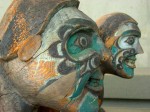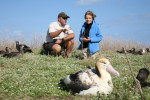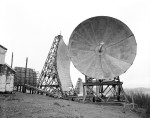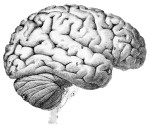While some college majors can offer a clearly defined career path, many don’t. In fact, less than 30% of college grads have a job that is directly related to their major. What you majored in doesn’t have to determine what you do for the rest of your life. But it’s a good place to start.
We think it’s unproductive to focus solely on jobs for your major, so we’ve put together a collection of articles that will help lead you to new career paths that you might not typically associate with your major.

via Wikimedia Commons
“Man is an animal suspended in webs of significance he himself has spun,” writes American anthropologist Clifford Geertz. As such, anthropologists take it as their charge to help untangle this web and understand the connections that create such a web in the first place – a study of human behavior at the cultural level. Anthropology is referred to as “the science of humanity” and has roots both in the humanities and in the sciences. The major itself is often subdivided into disciplines such as cultural anthropology, archaeology, linguistic anthropology, and biological anthropology, to name a few.
See careers for Anthropology majors

via Flickr User USFWS Pacific
At its most basic, biology is the study of life. Exploring the function, development, and growth of living systems from the human body to global climate, the chief aim of biology is to understand processes of evolution and the genes and cells that act as building blocks in our physical world. A highly multi-faceted and subdivided discipline, with specializations ranging from molecular and cellular biology to botany and physiology, choosing the study biology as an undergraduate can offer many different potential career paths and areas of focus.

via Flickr user Victor 1558
In regards to the entry-level job market, a business major may well be the most marketable undergraduate degree available. At once fashioning broad but highly pertinent set of skills and touching upon the areas of study that can land you in one of many potential industries, business majors enjoy a broad range of entry-level opportunities to choose from and as such the major is regarded as one of the most practical available. Whether looking to break into an industry or begin their own business venture, business majors are equipped with a skill set that can be directly applied to many fields.

via Flickr User Matteo Bagnoli
In a basic sense, Chemistry is the study of matter. Understanding how it behaves, what it’s made of, and what properties it has are the chief goals of those that study chemistry. While the better part of their work might take place in a sealed lab, working with microscopic atoms and particles, the influence of chemistry is all around us, from the water we drink to the medicines that keep us alive. In this way, chemistry is really a study of life processes, and in coming to understand the building blocks that make up our chemistry, chemists cultivate a great understanding of the way our physical world functions. While many chemistry majors go on to do some form of postgraduate study or use chemistry as a vehicle to work towards a medical degree, there are also many jobs attainable for those fresh out of the gate.

via Wikimedia
As human beings, we’d be pretty much nowhere without the ability to communicate. The very basis of our cultures, societies, economies, languages – everything is based on the symbols we all recognize to have common meaning. As such, the study of communications intersects many the other disciplines, such as sociology, psychology, anthropology, economics, philosophy, etc.
See careers for Communications majors
Right now, at this very moment, you’re reading this article on an electronic device, connected to the internet, none of which would be possible were it not for computer science. Now such an integral part of so many of modern daily life, from text messages to international trade, jobs in computer science-related fields are growing, innovative, and often well-paying. If you’ve always felt comfortable around computers, enjoy using technology in all of its many forms (while finding flaws in and hoping to innovate the technological systems you already use), and have found yourself the unwitting technical support representative to those around you, you might just be a perfect fit for a career in a computer science-related field.
Careers for Computer Science majors

via Flickr User Mark Wainwright
The first rule of economics I ever heard came from the mouth of my father. At the time, I was far too young to understand what he meant when he said, “Son, there’s no such thing as a free lunch”. And then he bought me lunch, which seemed pretty free to me. While this, of course, is a microcosmic and uber-simplified example, it remains true that economics, at its most basic, is a study of relationships (although usually larger in scope than the dynamic between father and son over turkey sandwiches).
See careers for Economics majors

via Flick User rtitoun
There once was a party at my university where the theme was to dress up as yourself in 10 years. Some showed up dressed as business executives, others as lab scientists. More than one English major showed up to this party dressed as a vagrant, bearing signs reading “Will critique Faulkner for food.” This story is a classic example of the dark humor with which English majors often regard their own futures. The popular lore is that most English majors end up as teachers, or vying for the dwindling number of jobs in publishing and journalism.
See careers for English majors

via Wikimedia Commons
Without engineers, the world wouldn’t go round. I suppose, then, that a thanks is in order. Thanks, engineers. Really. Designing, drafting, and constructing many of the systems and infrastructure we take often for granted on a day-to-basis, from roads and bridges to iPhones and NASA rockets, engineers have planned most of the man-made world around us. Degrees in engineering are often comprised of a Bachelors of Science degree with an additional specialized field, of which there are many, ranging from Biomedical and Mechanical to Civil and Electrical Engineering.
See careers for Engineering majors

via Wikimedia
The often-repeated saying goes that without studying the past, we are doomed to repeat its mistakes in the present (and future). Many consider this to mean that history as a university discipline aims to construct a mental tome of sorts, overflowing with historical facts in meticulously detail, and which one can crack open when in need of some age-old advice. Yet, being a student of history involves more than simply memorizing the events of the past. Instead, history majors look towards a greater understanding of the patterns, the causes and effects, of human behavior and existence.
See careers for History majors

via Flickr User dumbonyc
It’s estimated that today, the average American is exposed to over 5,000 advertisements per day. Compare that to an estimated 500 half a century ago, and it becomes clear that those behind the signs have a huge impact on our daily lives. While the displays themselves – from billboards to busses and park benches – are specifically designed and implemented by advertisers, those that work in marketing craft the greater strategies to engineer a desirable reputation around their product. Basically, they pull the strings that get us to buy stuff. It might sound a bit nefarious, but most of us love buying stuff, and will continue to love it, which means that working in marketing isn’t a bad choice for a post-graduate career.
See careers for Marketing majors

via Flickr User Ed Brambley
Learning mathematics is akin to learning a language. Just as we speak and write using symbols imbued with meaning, math majors become fluent in the language of numbers, distilling complex, real-world problems into mathematical equations, concepts, and principles that can then be, well, solved. The skills learned in an undergraduate mathematics program can run the gamut in terms of applicability in professional institutions. In short, every business needs someone who knows mathematics, whether or not mathematics are the directly related to the chief function of that business.
See careers for Mathematics majors

via Flickr User Brian Hillegas
“Cogito ergo sum”, wrote Rene Descartes, “I think, therefore I am.” Those that study philosophy aim to tackle such questions: those surrounding existence, ethics, reality, and language, to name a few. As a philosophy major, you’ve likely encountered different modes of thought from disparate cultures and time periods, reading the efforts of some of history’s most brilliant writers and thinkers attempting to solve the fundamental questions of human existence.
See careers for Philosophy majors

via Wikimeda
As a psychology major, you’ve studied the science of the mind, brain, and behavior. From the synapses that fire in our brains to the greater patterns of human development and interaction, psychologists learn the inner workings of the mind and the ways in which they contribute to greater social phenomena. You might have focused on topics such as how the brain works, human life develops, counseling and social psychology, mental disorders, and how we acquire new knowledge and memories. In short, you’ve learned what makes us tick as human, and therefore social, beings.
See careers for Psychology majors

via Flickr User Blixt
As a sociology student you’ve learned to “peel back the curtain” and glimpse at what lurks behind the exterior of society. Looking closely at the development and creation of social institutions as well as the actors and agents within them, sociologists study to understand the greater, macrocosmic patterns of society as well as the microcosmic occurrences of everyday life that take place in society and which work to define us all as individuals. You’ve studied a lot about how society works, how it constructs social beings, where power comes from, and how it’s maintained. Now it’s time to apply it in practice, not simply in theory.
See careers for Sociology majors
| Maintenance Technician I - IV FedEx Grove City, OH | View |
| Residential Sales Representative Spectrum Columbus, OH | View |
| Entry Level Border Patrol Agent - Up to $30,000 Sign On Bonus United States Customs and Border Protection Columbus, OH | View |
| Nanny Needed For My Children Care.com Columbus, OH | View |
| Automotive Fleet Mechanic C Transdev Columbus, OH | View |
| Outside Sales Representative - $5,000 hiring bonus Spectrum Columbus, OH | View |
| Data Scientist Genesis10 Columbus, OH | View |
| Entry Level Border Patrol Agent - Up to $30,000 Sign On Bonus United States Customs and Border Protection Columbus, OH | View |
| Remote Work From Home Data Entry Clerk - $1400 Weekly ITS Caliber Staffing Columbus, OH | View |
| Remote Work From Home Data Entry Clerk, $1400 Per Week The Job Place Columbus, OH | View |